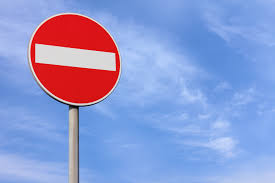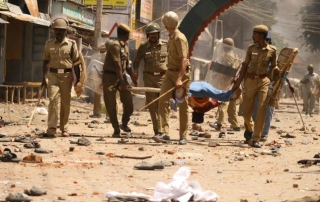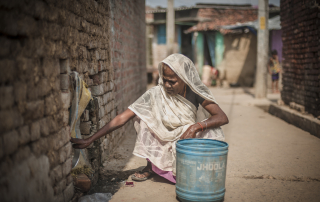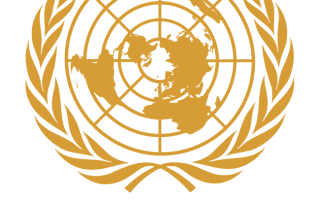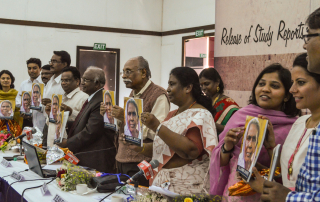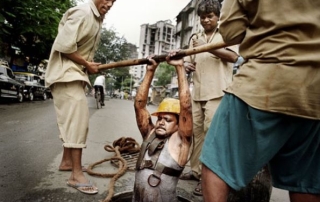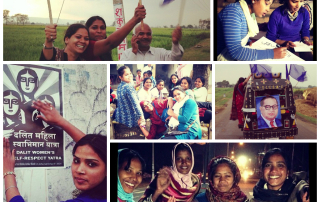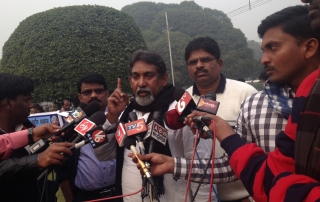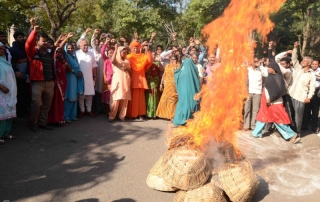Urgent Appeal: Brutal police torture of Dalit human rights defender – perpetrators must be held accountable
A 28 year old Dalit human rights defender, Mr. Poovarasan, was abducted from his house by five police officers in Tamil Nadu, and brutally tortured and abused using derogatory caste names. Following the abuse, the police filed false charges against him. Unable to walk, the victim was taken to court in an ambulance, and the Police inspector forced the ambulance with Mr. Poovarasan in it to drive off the court premises, while he threatened Mr. Poovarasan to remain silent about the assault. An urgent appeal has been launched to ensure proper medical treatment for the victim and consequences for the involved police officers.
Indian Minister says that manual scavenging persisists and the implementation of the manual scavenging act is being monitored
In a written reply to the Indian House of Parliament (Lok Sabha), the Indian Social Justice and Empowerment Minister, Thaawar Chand Gehlot, said that the practice of manual scavenging still persists in various parts of the country. He added that because previous laws banning the practice had proved inadequate, parliament had enacted the Prohibition of Employment as Manual Scavengers and their Rehabilitation Act, 2013, the implementation of which is now be monitored.
UN CEDAW Committee raises serious concern for Dalit women and the lack of implementation of laws
In the Committee on the Elimination of Discrimination against Women (CEDAW), review of India on 2nd July 2014, the issues of Dalit women and girls were brought up by several experts of the Committee and the Committee noted that Dalit women and the lack of implementation of laws were matters of serious concern.
Groundbreaking Report on Claiming Justice for Dalits in India
Told directly from victims, witnesses, community members, human rights defenders and public officials, the report analyzes over 400 atrocity cases, with 20 in-depth case studies covering atrocities such as murder, rape, mass attack, and land grabbing.
A landmark judgement in the fight to eradicate manual scavenging
The Indian Supreme Court has ruled that the continuance of manual scavenging in the country is in blatant violation of Article 17 of the Constitution of India by which, “untouchability is abolished and its practice in any form is forbidden”. The court was emphatic about the duty cast on all states and union territories “to fully implement the law and to take action against the violators”.
Dalit women in India stage month-long march for justice
For a full month Dalit women have marched in India to fight the vicious cycle of caste and gender discrimination that severely restricts the lives of Dalit women and subjects them to violence, rape and violations of their basic human rights in almost every sphere. They are marching to empower other Dalit women to stand up for themselves and join in the fight and they are demanding justice.
Dalits: Government must take immediate action to pass caste legislation
Dalits in India have united to issue an urgent appeal to the Indian Government to take immediate action on passing pending legislation amending the Prevention of Atrocities act, meant to stop atrocities against Dalits and Adivasis (tribals) in India. They are also asking the Government to approve a bill to ensure the proper allocation and distribution of budgets for Dalits and Adivasis.
Arrest of 15 Dalit and Adivasi activists protesting against the government’s broken promises
Dalit and Adivasi activists protested in front of the Indian Parliament Tuesday, to convey their anger that India’s ruling parties have broken their promise to table important budget bills, meant to benefit Dalits and Adivasis (SCP TSP Legislation) and amendments to the act meant to prevent atrocities against Dalits and Adivasis (the SC/ST PoA act).
New Manual Scavenging Legislation: New Hope and New Challenges
India is introducing new manual scavenging legislation meant to eradicate the humiliating practice of manual scavenging, which perseveres despite being outlawed for decades. Indian civil society are welcoming the initiative to introduce new legislation, but are flagging that the proposed draft legislation is missing critical necessary aspects that must be included before legislation is introduced on the 6th December.

